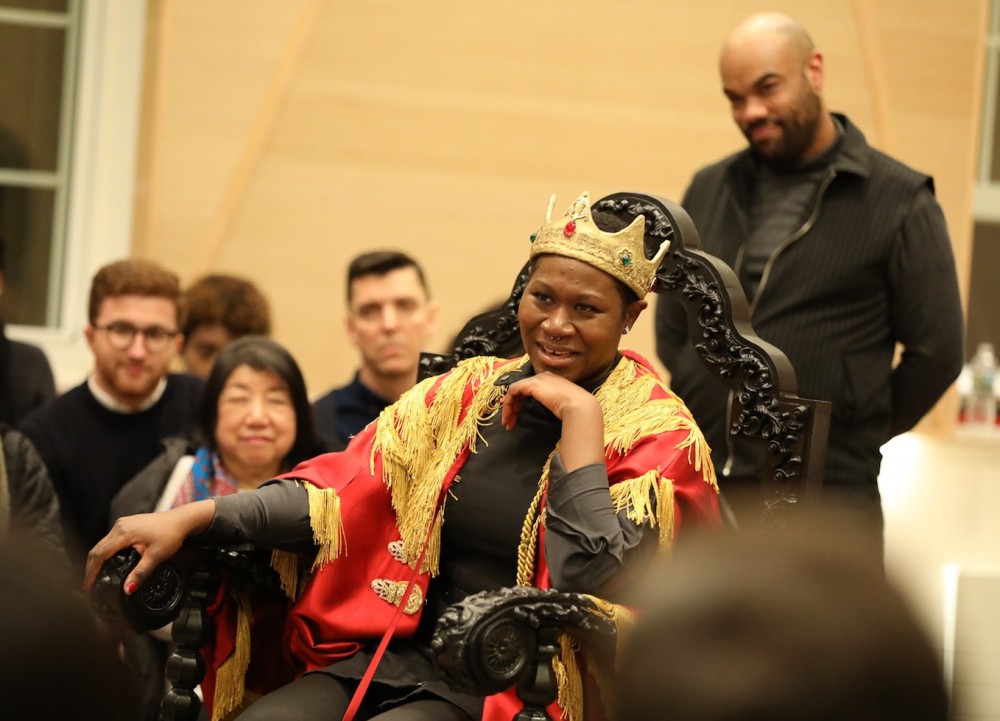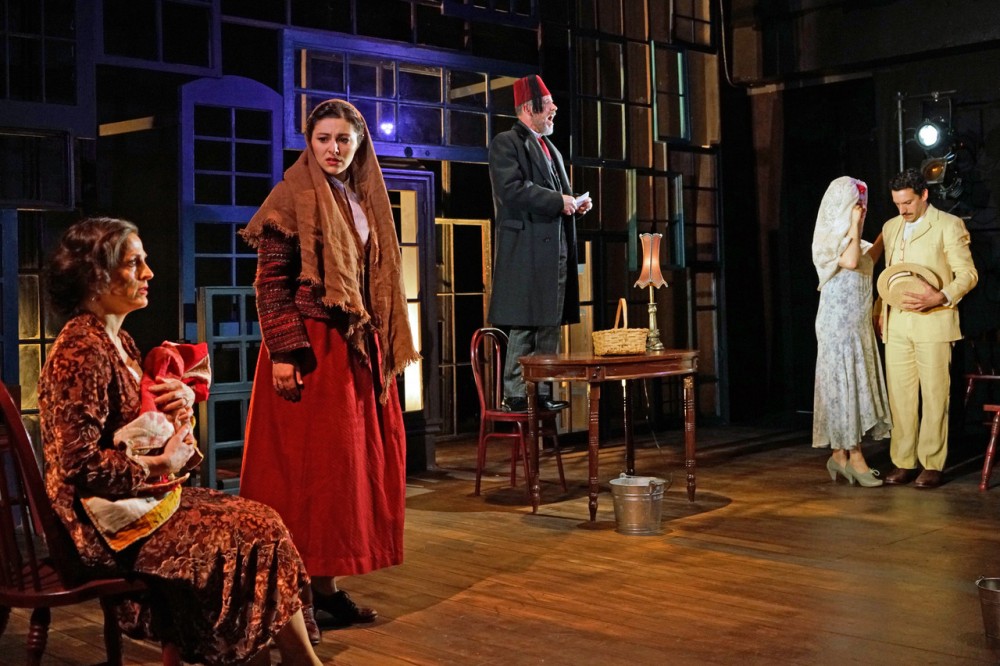By Marilyn Lester
Two rarely-presented Thornton Wilder one-act plays, mounted by The Peccadillo Theater Company, reflect the serious business of life, ironically juxtaposed against the cheerfully merry season of Christmas. Yet neither play, though deeply reflective, is joyless; each ends on the same note of hope. The Long Christmas Dinner portrays a slice of American life via the Bayard family and nine decade’s worth of Christmas dinners. Pullman Car Hiawatha brings a group of strangers together for an overnight train ride from New York to Chicago. Both plays are packed solid with Wilder philosophy, each sharply examining life, death and the relativity of time.
The Long Christmas Dinner, which debuted in November 1931, profiles 11 Bayard family members, over four generations, beginning in 1840. Through accelerated time, characters come and go; children are born; and attitudes, values and behaviours change. The anchoring constant is family. The set, designed by Harry Feiner (who also created intelligent, effective lighting for both plays), follows Wilder’s stage direction: a formal dining table center stage, flanked by two arches. One, house left, is garlanded and is used when characters enter. The arch on house right is black-draped, used when a character exits to the next world. The Long Christmas Dinner tasks each actor to age in their roles without benefit of makeup; the process has to be done by craft alone. Thus, eyeglasses appear and are put on and shawls produced, as if by magic – Nelly Reyes’ properties design was subtle and seamless. Especially poignant in portraying their aging characters were Brad Fryman as Cousin Brandon, John Pasha as Charles, and Gael Schaeffer as Cousin Ermengarde.
Director Dan Wackerman is unerringly true to Wilder’s vision and, except from some pacing issues, moved the action of the play effectively from start to conclusion. A peculiar Wilder stage direction: the serving of imaginary food, is disconcerting, but is one of the repetitive devices used to fortify the central theme of family (the Christmas sermon and the son needed to take over the family firm are two others). Genevieve, played by Barbra Wengerd, is the pivotal character of The Long Christmas Dinner: her life spans most of the 90 years depicted. Wengerd’s portrayal is strong and beautifully nuanced; her Genevieve changes from a pliant, idealistic girl to an assertive, ground-down elder. Finally, when she exits through the “life door,” fiercely exclaiming she’s leaving to “die abroad,” her frustration is palpable. As Genevieve departs, Ermengarde is left alone on stage, extremely old and alone. She walks toward the “death door” reading a letter announcing the birth of more children. Life will go on.


L to R: LAMAR GILES (white suit) as Archangel and GISELLE WOLF as Insane Woman (Pullman Car Hiawatha)
Pullman Car Hiawatha, set on December 21, 1930 (although it debuted in December 1932) is presided over by the “Stage Manager,” a god-like figure, who presages the narrator in Wilder’s later work, Our Town. Ten passengers, inhabiting berths and compartments in a car on the train “Hiawatha,” are bound overnight from New York to Chicago. Harry Feiner’s set of sparse, grey modules helps keep the focus on the action appropriately tight, especially when, a lá the film, Wings of Desire, we are allowed to overhear what each passenger is thinking.
Pullman Car Hiawatha is a metaphorical and metaphysical play, moving from the microcosm of the train interior to the macrocosm: “Now for [the car’s] position geographically, meteorologically, astronomically, theologically considered,” says the Stage Manager, played with playful gravity and complete authenticity by Michael Sean McGuiness. Audience members read “position statements” about various geographic aspects near the train. The ghost of a Workman appears amid the audience and recites his story in German. Three females representing The Hours recite philosophical monologues; echoing deep bell sounds are made to represent The Planets, amid which the actors come to life vocally, producing the “om” sound of the earth. The cacophony is stunning and inspiring. Ackerman’s tight direction and pacing work especially well in this macrocosm.
The backstage drop parts to reveal a staircase from which descends the Archangel (an overly impassive Lamar Giles). The Insane Woman, powerfully played by Giselle Wolf, animates with clear-thinking. She is willing to be taken to Heaven, but is denied – it’s just not her time. Harriet (Anna Marie Sell) has died during the night but refuses to leave with the angel. Eventually, like Emily in Our Town, she has an epiphany and willingly climbs the staircase to the afterlife. At play’s end, the train arrives in Chicago; all is restored to “normal” and the passengers disembark. A cleaning crew comes onboard; the stage goes dark as life, once more, goes on.
All of the large cast of A Wilder Christmas were workmanlike in executing the difficult task of interpreting Wilder’s heady text. They included James Beaman, Victoria Blankenship, Kristin Parker, Jeremy Russial, Barbara Salant, Rafe Terrizzi, Jamil Chokachi (who is also production Stage Manager), Merissa Czyz, and LaWanda Hopkins. Evocative costume design is by Marianne Custer, flawless sound design is by Quentin Chiappetta, and choreography is by Shea Sullivan.
A Wilder Christmas runs through January 3; Mondays and Wednesdays at 7 pm, Thursdays through Saturdays at 8 pm, matinees Sunday at 3 pm.
*Photos: Carol Rosegg
The Theater at St. Clements, 423 West 46th St., New York, NY. For tickets: 866-811-4111 or www.ThePeccadillo.com






















